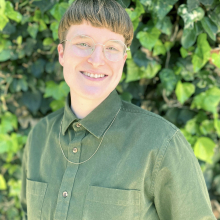Gracen Brilmyer
Assistant Professor
Pronouns: they/them

PhD, Department of Information Studies, University of California Los Angeles (UCLA). Dissertation: Proximity Matters: Disability, Erasure & the Archival Bond of Natural History
MIMS, School of Information, University of California Berkeley
BA, School of the Art Institute of Chicago
My research, located at the intersection of critical archival studies and disability studies, focuses on the ways in which disabled people use, experience, and understand themselves through archives as well as how we can tell histories of disability when there is little or no archival evidence. Part of my research uses interviews with disabled people to understand the affective impacts of archival material and spaces. This empirical research is complimented by historical / archival research that looks for disabled people in history, specifically within the history of natural history museums and their archives. Through a critical disability studies lens, I tease out the ways in which archival processes impact what we can and cannot find in archives as well as trace the conflation of disability, race and animality within natural history to center inquiry on how ableism is a central tenet of colonialism. Outside academia, I am involved in disability justice, design justice, and social justice technologies.
- GLIS 607
Brilmyer, Gracen, and Crystal Lee. 2023. “Terms of Use: Crip Legibility in Information Systems.” First Monday, January. https://doi.org/10.5210/fm.v28i1.12935.
Brilmyer, Gracen. “Toward a Crip Provenance: Centering Disability in Archives through Its Absence.” Journal of Contemporary Archival Studies 9, no. 1 (February 17, 2022). https://elischolar.library.yale.edu/jcas/vol9/iss1/3.
Brilmyer, Gracen Mikus. “‘I’m Also Prepared to Not Find Me. It’s Great When I Do, but It Doesn’t Hurt If I Don’t’: Crip Time and Anticipatory Erasure for Disabled Archival Users.” Archival Science, October 18, 2021. https://doi.org/10.1007/s10502-021-09372-1.
Brilmyer, Gracen. 2020. “Towards Sickness: Developing a Critical Disability Archival Methodology.” Journal of Feminist Scholarship 17 (17): 26–45. https://doi.org/10.23860/jfs.2020.17.03.
Brilmyer, Gracen, Joyce Gabiola, Jimmy Zavala, Michelle Caswell. “Reciprocal Archival Imaginaries: The shifting boundaries of “community” in community archives.” Archivaria 88 (November 14, 2019): 6–48.
Brilmyer, Gracen, María Montenegro, and Anne J. Gilliland. “Introduction: [Mis]Representation, [Dis]Memory, & [Re]Figuring the Archival Lens.” InterActions: UCLA Journal of Education and Information Studies 15, no. 2 (2019). https://escholarship.org/uc/item/9j13h4zb.
Brilmyer, Gracen. “Archival Assemblages: Applying Disability Studies’ Political/Relational Model to Archival Description.” Archival Science, April 2, 2018, 1–24. https://doi.org/10.1007/s10502-018-9287-6.
Michelle Caswell with graphic design by: Brilmyer, Gracen.“Teaching to Dismantle White Supremacy in Archives.” The Library Quarterly 87, no. 3 (June 8, 2017): 222–35. https://doi.org/10.1086/692299.